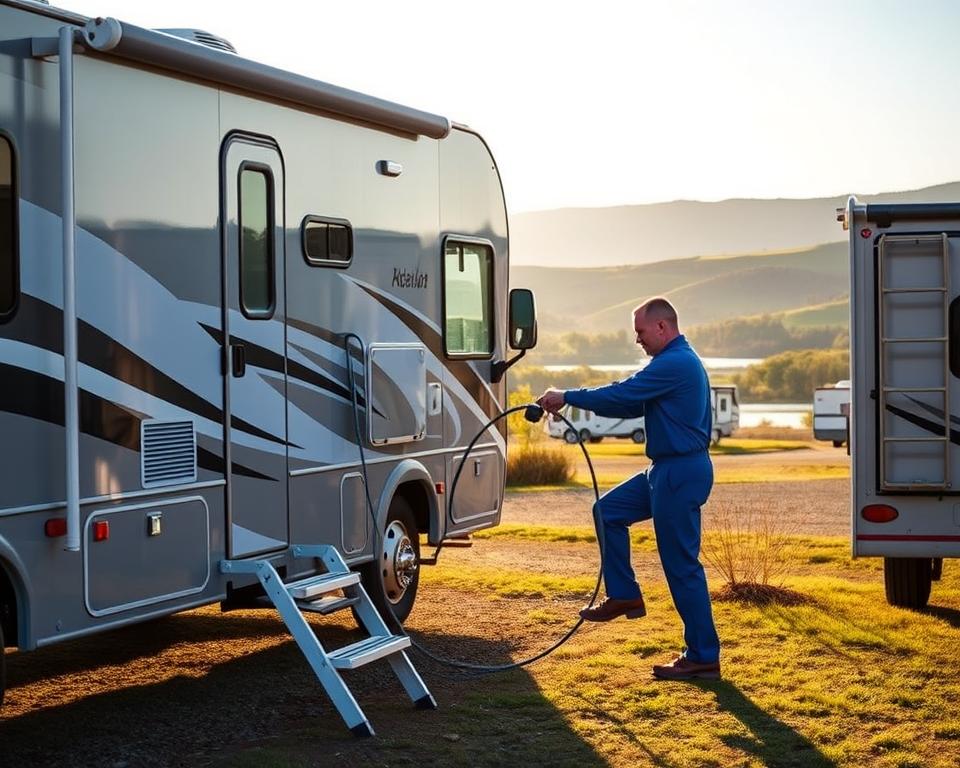RV Septic Pumping: Your Guide to Easy Disposal
Have you ever pondered about your RV’s waste management while enjoying the wilderness? Septic servicing matters greatly, perhaps more than you realize. Ensuring your rig’s sanitation system functions properly is essential for smooth travel. In this overview, we cover RV sewage setups, the need for septic pumping, and top tips for stress-free excursions. With All in Sanitation’s expertise in pump for RV holding tank, your trips can be as splendid as your destinations.
Key Highlights
- Understanding RV waste systems is crucial for efficient RV septic pumping.
- Regular septic pumping prevents unpleasant surprises during your travels.
- Best practices can extend the life of your RV’s plumbing system.
- Count on All in Sanitation for trustworthy camper tank services.
- Knowing when to pump helps ensure a hassle-free camping experience.
- Eco-friendly dumping practices reflect good RV stewardship.
Understanding RV Waste Systems
RV waste systems are essential for efficient waste management on the road. They include black and gray water tanks. The black tanks collect toilet waste. Meanwhile, gray tanks deal with wastewater from sinks and showers. Understanding how each tank works enhances your disposal process.
It’s critical to maintain these systems properly. Failing to pump the camper tanks regularly can cause clogs. Potentially ruining your outdoor excursions. Ensure regular checks to keep both tank types functioning well.
Using a dependable black water service is key for proper tank emptying. Also, treatments tailored for RV systems can prolong tank life and avert bad smells. Maintaining your sanitation setup enriches your camping freedom.
The Importance of RV Tank Emptying
Routine septic service ensures a clean and efficient RV. Neglecting wastewater management leads to foul smells, blockages, and system breakdowns. Waste buildup is a health hazard due to bacteria and contamination. Thus, ongoing upkeep is indispensable.
Choosing All in Sanitation guarantees green, compliant dumping. They handle your sewage with care and precision. Staying on top of septic servicing keeps your trips worry-free. It ensures your road trips remain enjoyable, avoiding the dangers of overlooked RV septic pumping.
How Often Should You Pump Your RV Septic?
The frequency of RV septic pumping is critical for proper waste management. It ensures your journey remains uninterrupted. Your pumping schedule depends on occupancy, tank capacity, and usage patterns.
For occasional RV users, it’s best to pump the black water tank every 3-5 days. Full-time campers often require more frequent dumping. Keeping an eye on your gauge refines your servicing schedule.
Using tank treatments helps you gauge emptying times. By adhering to these disposal recommendations, RV owners can effectively safeguard their systems. Avoiding overflows preserves your RV’s plumbing and cleanliness.

Methods for RV Septic Pumping
RV owners have multiple dumping methods at their disposal. The macerating method employs a macerator pump creating a slurry for easier disposal. It enables smooth transfers to dump points. Many choose it for its speed and simplicity.
Home septic dumping allows for emptying the RV’s holding tank directly into a residential septic system. Check local rules to ensure lawful dumping. This method is both environmentally safe and directly manages RV waste when properly used.
Gravity-fed dumping relies on height difference to empty tanks. Each method for RV septic pumping presents unique pros and cons. By understanding these, RV owners can select the most suitable option for their needs, ensuring effective waste management.
Essential RV Dumping Gear
Effective RV septic pumping requires appropriate tools. A durable sewer hose links your RV to disposal sites. Flexibility and strength are crucial qualities. A good sewer hose simplifies waste disposal, making it less of a hassle.
Include a macerator pump in your gear list. They convert solids into liquid for easier dumping. They’re particularly useful where gravity can’t aid the emptying process.
It’s crucial to maintain your RV septic pumping gear. Always clean hoses and tools post-use to avoid contamination. Proper storage guarantees readiness. Well-maintained gear ensures clean and smooth emptying.
Optimal RV Waste System Care
A tidy waste setup makes camping more enjoyable. To ensure this, it’s important to adopt best practices for RV sewer cleaning. First empty black water, then use gray water to flush. Gray water flushes residual solids, keeping lines clear.
Choose enzyme or bacterial additives for superior breakdown. They maintain a balanced microbial ecosystem in your tanks. Avoid bleach or strong cleaners that harm your septic’s helpful microbes.
Consistently rinsing tanks, hoses, and connectors is key to avoiding odors and blockages. Employing a dedicated sewer hose for black water use is a wise choice. This habit enhances overall sanitation hygiene.
Follow this routine to streamline sewer cleaning:
- Follow the black-then-gray dumping order.
- Apply microbial additives routinely.
- Steer clear of caustic cleaners.
- Clean equipment thoroughly each time.
- Check valves and seals to catch leaks early.
By adopting these habits, campers enhance system longevity. Resulting in stress-free outdoor adventures.
Upkeep for Trailer Septic Systems
Similar to RVs, mobile homes need regular septic care for lasting performance. Timely maintenance helps avoid costly fixes and downtime. A routine pump every 3–5 years suits most setups, based on usage and capacity.
Effective disposal methods are key to maintaining your septic system. Make sure to dispose of all waste and chemicals properly. To reduce damage, use biodegradable products and keep an eye on tank levels. Harsh chemicals should be avoided as they harm the microbes that break down waste.
Arrange periodic expert check-ups to spot issues before they escalate. These check-ups ensure your peace of mind by identifying issues before they worsen, thus maintaining smooth operation. Adhering to these maintenance tips will ensure the septic system of your mobile home remains in excellent condition.
RV Trailer Sewage Handling Guidelines
Proper camper dump practices enhance travel comfort. Locate approved dumping spots before departure. Verify legal compliance to prevent penalties and eco-harm. Using camper-safe solutions boosts tank health and dumping ease.
Utilizing freshwater is crucial in the disposal process. A thorough rinse eliminates leftover sludge. This residue can cause odors and blockages. Moreover, it supports an eco-friendly disposal method.
Plan ahead for worry-free dumping. By organizing your stops at disposal stations as per your travel plans, you can reduce hassle. This organization aids in streamlining the camper tank pumping process. Some useful tips for waste disposal include:
- Regularly monitor tank levels to decide when pumping is needed.
- Apply enzyme or bacteria-based solutions to decompose waste and boost tank performance.
- Always wear gloves and clean hands post-drainage gear handling.
Understanding RV Holding Tank Treatment
Efficient waste management in motorhomes relies heavily on proper RV holding tank treatment. Formulations contain targeted microbes and enzymes. They aim to break down waste effectively. Consistent use curbs odors and keeps flow unobstructed.
Introducing beneficial bacteria treatments is vital for a balanced microbial environment in RV tanks. They accelerate the natural decomposition process. Less frequent emptying prolongs service intervals.
When selecting an RV holding tank treatment, consider your motorhome’s requirements. Treatment options range widely. Opt for green, home-compatible formulas. They ensure efficient waste processing and enhance your RV’s waste management system.
| Type of Treatment | Key Components | Advantages |
|---|---|---|
| Liquid Treatments | Bacteria and enzymes | Easy to use; effective waste breakdown |
| Powdered Solutions | Catalytic agents | Cost-effective; long shelf life |
| Tablet Treatments | Compressed bacteria | Convenient; pre-measured dosages |
Pumping Pitfalls
Many RV owners make errors during septic pumping that complicate waste management. Skipping regular pumping leads to surprises. Resulting in overflow and malfunctions. Misusing cleaners harms beneficial bacteria. This often results in expensive repairs due to the disruption of system operations.
Dumping tanks out of sequence is a typical error. The sequence is crucial, especially for black water service. Failing to dump the black water before the gray can result in cross-contamination and foul odors. It’s also vital not to open the septic tank access lids during home dumping. Leave complex dumping tasks to experts for safety.
Moreover, neglecting equipment maintenance can cause leaks or clogs. Properly maintaining hoses and other essentials ensures an efficient and sanitary RV sewer cleaning process. Avoiding these pitfalls simplifies your outdoor experience. And keeps campsites fresh and hygienic.
In Summary
Comprehensive septic manuals are indispensable for RV enthusiasts. It makes road trips smoother. Consistent care and system knowledge boost your adventure quality. Employing correct methods and gear ensures stress-free camping.
Choosing All in Sanitation for septic services grants tranquility. Their skilled team manages waste with precision and care. Allowing you to focus on memories, not maintenance.
Regular RV septic service is more than a mere task; it’s a cornerstone of responsible RV ownership. It merges adventure with an odor-free, clean campsite. This balance ensures a pleasant experience for you and your companions on every journey.

